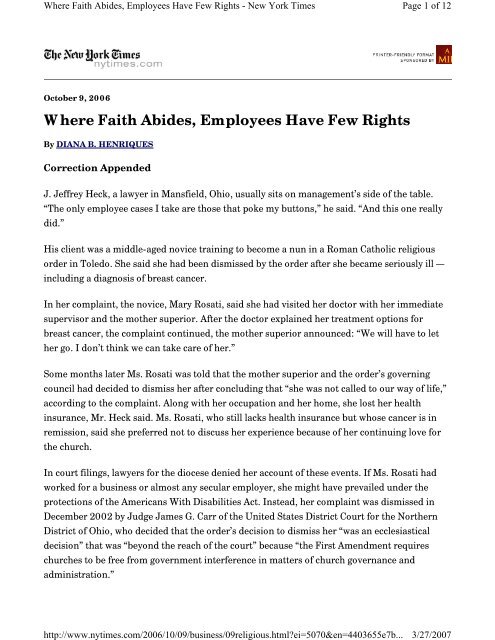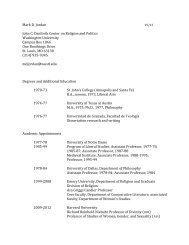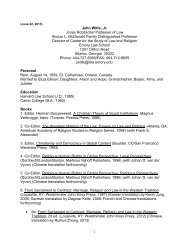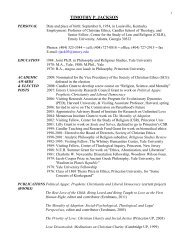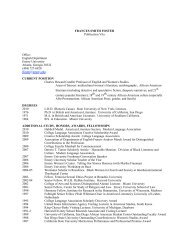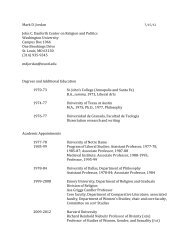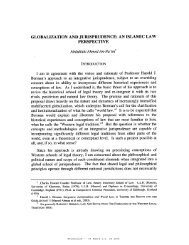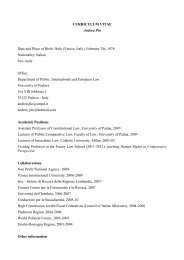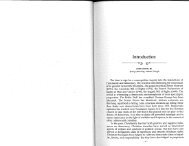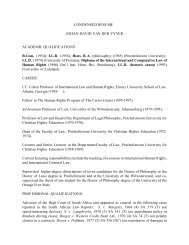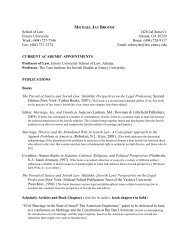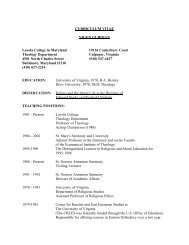Where Faith Abides, Employees Have Few Rights - Center for the ...
Where Faith Abides, Employees Have Few Rights - Center for the ...
Where Faith Abides, Employees Have Few Rights - Center for the ...
You also want an ePaper? Increase the reach of your titles
YUMPU automatically turns print PDFs into web optimized ePapers that Google loves.
<strong>Where</strong> <strong>Faith</strong> <strong>Abides</strong>, <strong>Employees</strong> <strong>Have</strong> <strong>Few</strong> <strong>Rights</strong> - New York Timeshttp://www.nytimes.com/2006/10/09/business/09religious.html?ei=5070&en=4403655e7b...Page 1 of 123/27/2007October 9, 2006<strong>Where</strong> <strong>Faith</strong> <strong>Abides</strong>, <strong>Employees</strong> <strong>Have</strong> <strong>Few</strong> <strong>Rights</strong>By DIANA B. HENRIQUESCorrection AppendedJ. Jeffrey Heck, a lawyer in Mansfield, Ohio, usually sits on management’s side of <strong>the</strong> table.“The only employee cases I take are those that poke my buttons,” he said. “And this one reallydid.”His client was a middle-aged novice training to become a nun in a Roman Catholic religiousorder in Toledo. She said she had been dismissed by <strong>the</strong> order after she became seriously ill —including a diagnosis of breast cancer.In her complaint, <strong>the</strong> novice, Mary Rosati, said she had visited her doctor with her immediatesupervisor and <strong>the</strong> mo<strong>the</strong>r superior. After <strong>the</strong> doctor explained her treatment options <strong>for</strong>breast cancer, <strong>the</strong> complaint continued, <strong>the</strong> mo<strong>the</strong>r superior announced: “We will have to le<strong>the</strong>r go. I don’t think we can take care of her.”Some months later Ms. Rosati was told that <strong>the</strong> mo<strong>the</strong>r superior and <strong>the</strong> order’s governingcouncil had decided to dismiss her after concluding that “she was not called to our way of life,”according to <strong>the</strong> complaint. Along with her occupation and her home, she lost her healthinsurance, Mr. Heck said. Ms. Rosati, who still lacks health insurance but whose cancer is inremission, said she preferred not to discuss her experience because of her continuing love <strong>for</strong><strong>the</strong> church.In court filings, lawyers <strong>for</strong> <strong>the</strong> diocese denied her account of <strong>the</strong>se events. If Ms. Rosati hadworked <strong>for</strong> a business or almost any secular employer, she might have prevailed under <strong>the</strong>protections of <strong>the</strong> Americans With Disabilities Act. Instead, her complaint was dismissed inDecember 2002 by Judge James G. Carr of <strong>the</strong> United States District Court <strong>for</strong> <strong>the</strong> Nor<strong>the</strong>rnDistrict of Ohio, who decided that <strong>the</strong> order’s decision to dismiss her “was an ecclesiasticaldecision” that was “beyond <strong>the</strong> reach of <strong>the</strong> court” because “<strong>the</strong> First Amendment requireschurches to be free from government interference in matters of church governance andadministration.”
<strong>Where</strong> <strong>Faith</strong> <strong>Abides</strong>, <strong>Employees</strong> <strong>Have</strong> <strong>Few</strong> <strong>Rights</strong> - New York Timeshttp://www.nytimes.com/2006/10/09/business/09religious.html?ei=5070&en=4403655e7b...Page 2 of 123/27/2007Legislators and regulators are not <strong>the</strong> only people in government who have drafted specialrules <strong>for</strong> religious organizations. Judges, too, have carved out or preserved safe havens thatshield religious employers of all faiths from most employee lawsuits, from laws protectingpensions and providing unemployment benefits, and from laws that give employees <strong>the</strong> right to<strong>for</strong>m unions to negotiate with <strong>the</strong>ir employers.Some of <strong>the</strong>se exemptions are rooted in long traditions, while o<strong>the</strong>rs have grown from courtdecisions over <strong>the</strong> last 15 years. Toge<strong>the</strong>r, <strong>the</strong>y are expanding <strong>the</strong> ability of religiousorganizations — especially religious schools — to manage <strong>the</strong>ir affairs with less interferencefrom <strong>the</strong> government and <strong>the</strong>ir own employees.The most sweeping of <strong>the</strong>se judicial protections, and <strong>the</strong> one that confronted <strong>the</strong> novice nun inToledo, is called <strong>the</strong> ministerial exception. Judges have been applying this exception,sometimes called <strong>the</strong> church autonomy doctrine, to religious employment disputes <strong>for</strong> morethan 100 years.As a rule, state and federal judges will handle any lawsuit that is filed in <strong>the</strong> right place in anappropriate, timely manner. But judges will almost never agree to hear a controversy thatwould require <strong>the</strong>m to delve into <strong>the</strong> doctrines, governance, discipline or hiring preferences ofany religious faith. Citing <strong>the</strong> protections of <strong>the</strong> First Amendment, <strong>the</strong>y have ruled with greatconsistency that congregations cannot fully express <strong>the</strong>ir faith and exercise <strong>the</strong>ir religiousfreedom unless <strong>the</strong>y are free to select <strong>the</strong>ir own spiritual leaders without any interference fromgovernment agencies or second-guessing by <strong>the</strong> courts.To do o<strong>the</strong>rwise would be an intolerable government intrusion into employment relationshipsthat courts have called “<strong>the</strong> lifeblood” of religious life and <strong>the</strong> bedrock of religious liberty,explained Edward R. McNicholas, co-chairman of <strong>the</strong> national religious institutions practice in<strong>the</strong> Washington, D.C., office of Sidley Austin, a law firm with some of <strong>the</strong> country’s largestreligious organizations among its clients.Judges have routinely invoked <strong>the</strong> ministerial exception to dismiss lawsuits against religiousemployers by rabbis, ministers, cantors, nuns and priests — those “whose ministry is a coreexpression of religious belief <strong>for</strong> that congregation,” as Mr. McNicholas put it.But judges also have applied <strong>the</strong> exception to dismiss cases filed by <strong>the</strong> press secretary at aRoman Catholic church, a writer <strong>for</strong> The Christian Science Monitor, administrators at religiouscolleges, <strong>the</strong> disgruntled beneficiaries of a Lu<strong>the</strong>ran pension fund, <strong>the</strong> overseer of <strong>the</strong> kosherkitchen at a Jewish nursing home and a co-founder of Focus on <strong>the</strong> Family, run by <strong>the</strong>conservative religious leader James C. Dobson. Court files show that some of <strong>the</strong>se people were
<strong>Where</strong> <strong>Faith</strong> <strong>Abides</strong>, <strong>Employees</strong> <strong>Have</strong> <strong>Few</strong> <strong>Rights</strong> - New York Timeshttp://www.nytimes.com/2006/10/09/business/09religious.html?ei=5070&en=4403655e7b...Page 3 of 123/27/2007surprised to learn that <strong>the</strong>ir work had been considered a “core expression of religious belief” by<strong>the</strong>ir employer.Religious employers have long been shielded from all complaints of religious discrimination byan exemption that was built into <strong>the</strong> Civil <strong>Rights</strong> Act of 1964 and expanded in 1972. Thathistoric exemption allows <strong>the</strong>m to give preference in hiring to candidates who share <strong>the</strong>ir faith.In recent years, some judges have also refused to interfere when religious groups havedismissed lesbians, unwed mo<strong>the</strong>rs and adulterous couples, even if <strong>the</strong>y profess <strong>the</strong> same faith,because <strong>the</strong>y have violated <strong>the</strong>ir employers’ religious codes.A federal court decision has given religious broadcasters an exemption from some of <strong>the</strong> fairhiringrequirements of <strong>the</strong> Federal Communications Commission, even when <strong>the</strong>y are hiringsecretaries and receptionists. Two o<strong>the</strong>r decisions, one in federal court affecting a Mormonchurch and <strong>the</strong> o<strong>the</strong>r in a state court of appeals case involving a Roman Catholic nursing home,affirmed <strong>the</strong> right of religious employers to dismiss employees whose faith changed after <strong>the</strong>ywere hired.“These are very difficult cases because <strong>the</strong>y pull at some very fundamental heartstrings,” saidSteven C. Sheinberg, a lawyer at Outten & Golden, specializing in employment law. “There’sour belief that employees should be free of discrimination in <strong>the</strong>ir work, versus our belief thatreligious organizations should be free to hire people who best help <strong>the</strong>m fulfill <strong>the</strong>ir religiousmission, without <strong>the</strong> intrusion of government.”<strong>Employees</strong> at religious institutions face o<strong>the</strong>r risks as well, thanks to pension law exemptionsgranted by Congress and upheld by <strong>the</strong> courts. Religious employers are exempt from Erisa, <strong>the</strong>federal pension law that establishes disclosure requirements and conflict-of-interestrestrictions <strong>for</strong> employee pension plans. That exemption has given rise to several cases inwhich workers at religious hospitals found that <strong>the</strong>ir pensions had vanished because ofpractices that would not have been allowed under Erisa’s rules.A related exemption frees religious employers from participating in <strong>the</strong> Pension BenefitGuaranty Corporation, <strong>the</strong> government-run insurance program that provides a safety net <strong>for</strong>corporate pension plans. And some significant court decisions in labor disputes in <strong>the</strong> lastseveral years have made it easier <strong>for</strong> religious schools and colleges to resist collectivebargaining ef<strong>for</strong>ts.But <strong>for</strong> Mr. Heck, <strong>the</strong> question of whe<strong>the</strong>r <strong>the</strong>se workplace exemptions are fair to religiousemployees was crystallized by <strong>the</strong> case of Ms. Rosati, <strong>the</strong> novice nun in Toledo.
<strong>Where</strong> <strong>Faith</strong> <strong>Abides</strong>, <strong>Employees</strong> <strong>Have</strong> <strong>Few</strong> <strong>Rights</strong> - New York Timeshttp://www.nytimes.com/2006/10/09/business/09religious.html?ei=5070&en=4403655e7b...Page 4 of 123/27/2007He said <strong>the</strong> doctor involved in her case had been prepared to testify under oath on Ms. Rosati’sbehalf. The doctor “had quite a vivid memory about <strong>the</strong>se events.” In fact, Mr. Heck said, <strong>the</strong>doctor had cautioned <strong>the</strong> nuns who accompanied Ms. Rosati that it would be virtuallyimpossible <strong>for</strong> <strong>the</strong> ailing novice to get af<strong>for</strong>dable insurance anywhere else if she were droppedfrom <strong>the</strong> diocesan health.Lawyers <strong>for</strong> <strong>the</strong> diocese disputed Ms. Rosati’s account of that visit and denied that healthreasons were <strong>the</strong> causes of her rejection by <strong>the</strong> order, <strong>the</strong> Sisters of <strong>the</strong> Visitation of Holy Mary,which is covered by <strong>the</strong> diocesan health plan. For <strong>the</strong> court “to even begin to inquire into thatdecision-making process, we believe, crosses <strong>the</strong> line set by <strong>the</strong> First Amendment,” saidGregory T. Lodge, a lawyer <strong>for</strong> both <strong>the</strong> Toledo diocese and <strong>the</strong> order, which operates underpapal authority.“I understand and absolutely appreciate that in matters of religion, <strong>the</strong> state has no businessmeddling,” Mr. Heck said. “It would be unthinkable <strong>for</strong> a judge to be able to say, ‘Hey, I don’tlike <strong>the</strong> way you’re interpreting <strong>the</strong> Book of Luke.’ ”But what religious principle is offended when an employee simply grows old or becomes ill, heasked. If <strong>the</strong> answer is “none,” he continued, judges should be more willing to “look behind <strong>the</strong>curtain.”Exemptions From Employee SuitsFor 28 days last May, Lynette M. Petruska, a <strong>for</strong>mer nun who now lives in St. Louis, thoughtshe had finally found judges willing to listen to her complaint against Gannon University, acoeducational Catholic college in downtown Erie, Pa. As it turned out, she was wrong.Ms. Petruska was educated in Catholic schools from kindergarten to college commencement,graduated at <strong>the</strong> top of her law school class and practiced law <strong>for</strong> several years be<strong>for</strong>e decidingto become a nun. In 1999, as she was working toward taking her final vows, she became <strong>the</strong>first woman to serve as Gannon’s chaplain.Three years later she was demoted and, according to her complaint, effectively <strong>for</strong>ced out. Inher lawsuit, she said this action was in response to her having notified <strong>the</strong> administration of acase of sexual misconduct by a senior university official, resisted ef<strong>for</strong>ts to cover up that caseand opposed proposals to weaken campus policies on sexual harassment. In 2004, she sued,accusing <strong>the</strong> university administration of <strong>for</strong>cing her out simply because she was a woman andbecause she had opposed <strong>the</strong> sexual harassment o<strong>the</strong>rs experienced on campus.
<strong>Where</strong> <strong>Faith</strong> <strong>Abides</strong>, <strong>Employees</strong> <strong>Have</strong> <strong>Few</strong> <strong>Rights</strong> - New York Timeshttp://www.nytimes.com/2006/10/09/business/09religious.html?ei=5070&en=4403655e7b...Page 5 of 123/27/2007Gender bias claims against religious employers have generally been dismissed under <strong>the</strong>ministerial exception. But some judges across <strong>the</strong> country have been less quick to dismiss caseswhere sexual harassment or abuse of an employee is involved. And unlike many o<strong>the</strong>rplaintiffs, Ms. Petruska claimed that her supervisor had actually acknowledged to her that shewas being demoted solely because of her sex, not because of any religious doctrine.Judge Sean J. McLaughlin of <strong>the</strong> United States District Court <strong>for</strong> <strong>the</strong> Western District ofPennsylvania never<strong>the</strong>less ruled that Gannon was protected by <strong>the</strong> First Amendment and <strong>the</strong>ministerial exception from any court interference in its choice of chaplain. Gannon itselfargued that it had many women in leadership positions and that Ms. Petruska had resignedsimply because she was unhappy with a staff reorganization. But its fundamental argumentwas that it would be unconstitutional <strong>for</strong> <strong>the</strong> court to second-guess <strong>the</strong>se disputed decisions.“You may ask, ‘Why should <strong>the</strong>se decisions go unquestioned?’ The reason is plain and simple:The First Amendment protects a church’s right to freely exercise its religion,” said Evan C.Rudert, a lawyer <strong>for</strong> <strong>the</strong> university. “And that includes organizing itself as it chooses andselecting those who it believes will serve best as its leaders — without interference from <strong>the</strong>courts.”Then, last May, in a decision that caused considerable comment in legal circles around <strong>the</strong>country, a federal appeals court panel reversed <strong>the</strong> trial judge’s decision.For four weeks, <strong>the</strong> prevailing law in Pennsylvania, New Jersey, Delaware and <strong>the</strong> VirginIslands — <strong>the</strong> jurisdiction of <strong>the</strong> United States Court of Appeals <strong>for</strong> <strong>the</strong> Third Circuit — wasthat “employment discrimination unconnected to religious belief, religious doctrine, or <strong>the</strong>internal regulations of a church is simply <strong>the</strong> exercise of intolerance, not <strong>the</strong> free exercise ofreligion.”Appellate Judge Edward R. Becker wrote that opinion, but he died several days be<strong>for</strong>e it was<strong>for</strong>mally issued. Judge Becker’s colleague on <strong>the</strong> three-judge panel, Judge D. Brooks Smith,filed a stinging dissent. On June 20, in a rare move, <strong>the</strong> Third Circuit granted Gannon’s routinerequest to have <strong>the</strong> case reconsidered and named Judge Smith to <strong>the</strong> new three-judge panelthat would do so.On Sept. 6, <strong>the</strong> new panel swept <strong>the</strong> earlier decision away, unequivocally restoring <strong>the</strong>protections <strong>for</strong> religious employers that it had put in doubt. As Judge Smith put it, <strong>the</strong>ministerial exception “applies to any claim, <strong>the</strong> resolution of which would limit a religiousinstitution’s right to choose who will per<strong>for</strong>m particular spiritual functions.”
<strong>Where</strong> <strong>Faith</strong> <strong>Abides</strong>, <strong>Employees</strong> <strong>Have</strong> <strong>Few</strong> <strong>Rights</strong> - New York Timeshttp://www.nytimes.com/2006/10/09/business/09religious.html?ei=5070&en=4403655e7b...Page 6 of 123/27/2007Ms. Petruska, who has left her order and returned home to work at her old law firm, describesherself as a feminist who is “committed to peace and freedom.” She has a long history ofputting her words into action — she has been arrested at protest marches, most recently at anantiwar rally <strong>the</strong> day be<strong>for</strong>e <strong>the</strong> Iraq war began, she said. She plans to appeal <strong>the</strong> ruling agains<strong>the</strong>r.“I think this issue needs to be decided by <strong>the</strong> Supreme Court,” she said. And she has hopes that<strong>the</strong> justices will agree with Judge Becker that, absent some grounding in religious doctrine, sexdiscrimination by religious employers is wrong.No Recourse On Age BiasAdd age discrimination to that wish list, <strong>the</strong> Rev. John Paul Hankins says.At 73, Mr. Hankins can look back on 50 years in a loving marriage, 40 years as a minister in <strong>the</strong>United Methodist Church — and 3 years as <strong>the</strong> plaintiff in an uphill court fight over hisdenomination’s mandatory retirement policy.Eight months after he turned 70, that policy <strong>for</strong>ced Mr. Hankins to leave his pulpit in <strong>the</strong>historic Stony Brook Community Church in Stony Brook, N.Y., where he had served <strong>for</strong> 37years. He loved his flock and <strong>the</strong> feeling was mutual: <strong>the</strong> congregation withheld part of itsannual contribution to <strong>the</strong> regional church that year to express its dismay.“He had served <strong>for</strong> many, many years and wanted to continue to serve, and his congregationwanted that, too,” said David S. Warren, a professor of computer science at Stony BrookUniversity who had been a member of <strong>the</strong> congregation <strong>for</strong> more than 25 years but who leftbecause of how Mr. Hankins was treated.Mr. Hankins said he was suing because age discrimination is almost as hateful and senseless tohim as <strong>the</strong> racial segregation and bias against women that used to be “mandatory policies” ofhis church.“I feel, and have long felt, that discrimination in any <strong>for</strong>m has no place in <strong>the</strong> life of a faithcommunity,” he said.Under <strong>the</strong> federal age discrimination law, most employees of all but <strong>the</strong> smallest businessescan sue if <strong>the</strong>y are <strong>for</strong>ced to retire <strong>for</strong> no o<strong>the</strong>r reason than that <strong>the</strong>y reached a certain birthday;increasingly, government and academic employees have <strong>the</strong> same protection. But Mr. Hankinsknows his complaint will probably never come to trial simply because he is a clergy member
<strong>Where</strong> <strong>Faith</strong> <strong>Abides</strong>, <strong>Employees</strong> <strong>Have</strong> <strong>Few</strong> <strong>Rights</strong> - New York Timeshttp://www.nytimes.com/2006/10/09/business/09religious.html?ei=5070&en=4403655e7b...Page 7 of 123/27/2007trying to sue his church. Indeed, court rulings around <strong>the</strong> country suggest that if he had been<strong>for</strong>ced out at any age and <strong>for</strong> almost any reason — <strong>for</strong> a deceptive reason, or even <strong>for</strong> no reasonat all — he would face <strong>the</strong> same judicial roadblock.“I never, ever thought that <strong>the</strong> last years of my ministry would be involved in a fight like this,”Mr. Hankins said.Lawrence H. McGaughey, <strong>the</strong> lawyer <strong>for</strong> <strong>the</strong> regional Methodist governing body and its bishop,acknowledged that <strong>the</strong>re is a movement in <strong>the</strong> church to eliminate <strong>the</strong> retirement rule opposedby Rev. Hankins. But if <strong>the</strong> rule is ultimately changed, it should be <strong>the</strong> church’s decision, not acourt’s, he said.“Any private employer would feel <strong>the</strong> same way — <strong>the</strong>y’d like to be able to make <strong>the</strong>se decisionswithout having to face <strong>the</strong> courts,” Mr. McGaughey said. “But <strong>the</strong> difference is <strong>the</strong> FirstAmendment.”He continued: “We’re talking about worship here. Are you going to go into church and havesomeone standing <strong>the</strong>re who was ordered to be <strong>the</strong>re by <strong>the</strong> courts? There are certain things agovernment just cannot do in this country.”In September 2003, a federal trial judge on Long Island ruled that Mr. Hankins’s complaintwas barred by <strong>the</strong> ministerial exception. Last February, a federal appeals court panel sent <strong>the</strong>case back, directing <strong>the</strong> trial judge to decide <strong>the</strong> case by applying a 1993 federal law, <strong>the</strong>Religious Freedom Restoration Act, ra<strong>the</strong>r than <strong>the</strong> ministerial exception doctrine. But <strong>the</strong>rewas little in <strong>the</strong> instructions to <strong>the</strong> trial court to encourage Mr. Hankins.He never<strong>the</strong>less thinks his complaint will eventually help his church see that its mandatoryretirement rule is unfair.“I don’t need to win <strong>the</strong> case,” Mr. Hankins said. “I feel <strong>the</strong> movement of history at work here, Ireally do. Ideas find <strong>the</strong>ir feet, and start to walk.”State judges have been equally reluctant to interfere in disputes between religious employersand <strong>the</strong>ir staff members — to <strong>the</strong> sad frustration of Rabbi Isaac H. Celnik of Albuquerque.Rabbi Celnik, one of <strong>the</strong> youngest men ever ordained in Conservative Judaism, was just 30when he was hired in 1971 as <strong>the</strong> spiritual leader of Congregation B’nai Israel. Eight years later,he entered into a 30-year contract with <strong>the</strong> synagogue, an arrangement his congregationendorsed by a margin of almost nine to one, he said.
<strong>Where</strong> <strong>Faith</strong> <strong>Abides</strong>, <strong>Employees</strong> <strong>Have</strong> <strong>Few</strong> <strong>Rights</strong> - New York Timeshttp://www.nytimes.com/2006/10/09/business/09religious.html?ei=5070&en=4403655e7b...Page 8 of 123/27/2007Then <strong>the</strong> medical problems began. In 1996, Rabbi Celnik was told he was in <strong>the</strong> early stages ofParkinson’s disease; in April 2000, his wife, Peggy, was told she had breast cancer. In October2000, he said, <strong>the</strong> president of <strong>the</strong> congregation’s governing board at <strong>the</strong> time suggested heretire on disability.But <strong>the</strong> rabbi did not consider himself disabled and did not want to retire, he said. He had twoyoung children and a wife whose treatment required continuing health insurance. He “loved<strong>the</strong> work, and loved <strong>the</strong> congregation,” he said. Indeed, when <strong>the</strong> synagogue’s cantor resigned amonth after <strong>the</strong> retirement discussion, Rabbi Celnik proposed, and <strong>the</strong> board agreed, that hewould take on <strong>the</strong> cantor’s duties as well, he said.But <strong>the</strong> relationship deteriorated as he tried to negotiate retirement terms that would providehim and his family with adequate financial security. In January 2002, after those negotiationsfaltered, he was dismissed; in 2003, he sued. But last February, <strong>the</strong> state’s court of appealsdismissed his case, based on <strong>the</strong> ministerial exception, also called <strong>the</strong> church autonomydoctrine.“We are sympa<strong>the</strong>tic to Rabbi Celnik’s struggles with Parkinson’s and <strong>the</strong> manifestation of <strong>the</strong>disease after so many years of service,” <strong>the</strong> chief judge wrote. But he ruled that <strong>the</strong> dispute “isprecisely <strong>the</strong> type of religious debate that <strong>the</strong> church autonomy doctrine is intended to protectfrom judicial review.”The congregation’s current president, Alan M. Chodorow, declined to discuss <strong>the</strong> details of <strong>the</strong>dispute. “I do not want to talk about anything that might impair our search <strong>for</strong> reconciliationand <strong>for</strong>giveness” with Rabbi Celnik, he said. “But I will say that we believe strongly in <strong>the</strong>separation of church and state, and that <strong>the</strong> state should not have any part in choosing ourspiritual leaders.”But Mr. Chodorow said that he was sympa<strong>the</strong>tic to <strong>the</strong> situation that this freedom <strong>for</strong>congregations created <strong>for</strong> employees and that he believed that religious institutions have toprovide o<strong>the</strong>r protections by contract. Although clergy members in many faiths work without<strong>for</strong>mal contracts, <strong>the</strong> model contract in wide use within Conservative Judaism provides thatrabbis and cantors can terminate <strong>the</strong> agreement without cause and seek binding arbitration toresolve disputes, he said.The church autonomy doctrine “takes away certain rights and this is put in specifically <strong>for</strong> <strong>the</strong>purpose of preserving rights,” Mr. Chodorow said.Rabbi Celnik and his wife continue to struggle with <strong>the</strong> financial and physical burdens of his
<strong>Where</strong> <strong>Faith</strong> <strong>Abides</strong>, <strong>Employees</strong> <strong>Have</strong> <strong>Few</strong> <strong>Rights</strong> - New York Timeshttp://www.nytimes.com/2006/10/09/business/09religious.html?ei=5070&en=4403655e7b...Page 9 of 123/27/2007deteriorating health and her second episode of cancer. “They don’t teach this in rabbinicalschool,” <strong>the</strong> rabbi said in a recent interview. Teach what? Mrs. Celnik answered be<strong>for</strong>e hecould: “Don’t get old. Don’t get sick.”Mr. McNicholas, <strong>the</strong> Sidley Austin lawyer, acknowledged that some “unjust and sinful”treatment has been protected from litigation by <strong>the</strong> ministerial exception. But he argued that“<strong>the</strong> openness of <strong>the</strong> religious process” would remedy those situations, making it possible <strong>for</strong> aclergy member dismissed by one congregation to find a home in ano<strong>the</strong>r.But what if <strong>the</strong>y are sick? “That’s harder — and very troubling,” Mr. McNicholas said. “But ifyou have a judge deciding it, that’s just too much intervention in <strong>the</strong> process of deciding <strong>the</strong>hiring issues” at religious institutions. “There’s no easy answer.”Protections Against UnionizationThe University of Great Falls, in Montana, has a tidy urban campus, a bold crucifix-toppedchapel, a master’s program in criminal justice and, according to one student’s Internet posting,a cafeteria that serves pretty good spaghetti.What <strong>the</strong> small Roman Catholic college doesn’t have is a faculty union.It wasn’t <strong>for</strong> lack of trying. In 1995, <strong>the</strong> Montana Federation of Teachers, which had unionizedmost of <strong>the</strong> public universities in Montana, asked <strong>the</strong> National Labor Relations Board torecognize it as <strong>the</strong> collective bargaining agent <strong>for</strong> <strong>the</strong> teaching staff at Great Falls.“Some of <strong>the</strong> faculty members <strong>the</strong>re traveled in circles that included professors at <strong>the</strong> o<strong>the</strong>rschools,” recalled James McGarvey, who was president of <strong>the</strong> Montana Federation of Teachersat <strong>the</strong> time. (It has since merged with <strong>the</strong> Montana Education Association.) Teachers at thoseo<strong>the</strong>r campuses had better pay and more favorable work rules, and some professors at GreatFalls had expressed interest in seeing whe<strong>the</strong>r <strong>the</strong> federation could help <strong>the</strong>m as well,according to Mr. McGarvey. “We felt we had a pretty strong showing,” he said.J. C. Weingartner, a union lawyer who worked on <strong>the</strong> campaign, said that while “pay did comeinto it, it wasn’t what got it started.” That spark was discontent among some professors over<strong>the</strong> president’s appointing members to an important advisory council who “did not reflect <strong>the</strong>views of <strong>the</strong> majority of <strong>the</strong> faculty” in negotiations with <strong>the</strong> administration, he said. “So <strong>the</strong>yfelt <strong>the</strong>ir interests would be better served with collective bargaining.”The university, which has a new management team today, declined to comment on <strong>the</strong> long
<strong>Where</strong> <strong>Faith</strong> <strong>Abides</strong>, <strong>Employees</strong> <strong>Have</strong> <strong>Few</strong> <strong>Rights</strong> - New York Timeshttp://www.nytimes.com/2006/10/09/business/09religious.html?ei=5070&en=4403655e7b...Page 10 of 123/27/2007legal battle.But when <strong>the</strong> labor board held a hearing on <strong>the</strong> union’s request, <strong>the</strong> university’s lawyers arguedthat <strong>the</strong> board had no jurisdiction because <strong>the</strong> university was a religious institution, and to<strong>for</strong>ce it to negotiate with <strong>the</strong> union would violate its religious liberty.The university based its case largely on a 1979 decision in which <strong>the</strong> United States SupremeCourt ruled that <strong>the</strong> labor board’s jurisdiction did not extend to religious schools. After thatdecision, which resulted in what is called <strong>the</strong> Catholic Bishop doctrine, <strong>the</strong> board began caseby-caseexaminations to determine whe<strong>the</strong>r <strong>the</strong> schools that came be<strong>for</strong>e it were sufficientlyreligious — whatever <strong>the</strong>ir faith — to be exempt from its jurisdiction.The University of Great Falls did not qualify, <strong>the</strong> board concluded in February 1996.For <strong>the</strong> next seven years, <strong>the</strong> little Catholic college fought both <strong>the</strong> federal labor board and <strong>the</strong>faculty union, keeping lots of lawyers busy and incurring official charges of unfair laborpractices in <strong>the</strong> process. In 2002, it won.The federal appeals court panel in Washington ruled that a three-prong test should be <strong>the</strong> laborboard’s only standard <strong>for</strong> determining which schools were religious enough to be exempt from<strong>the</strong> nation’s collective bargaining laws under <strong>the</strong> Catholic Bishop decision.Any school that is nonprofit, has a religious affiliation and presents itself to <strong>the</strong> public as areligious institution must be exempted from jurisdiction, <strong>the</strong> court said. And that included <strong>the</strong>University of Great Falls.And <strong>the</strong> court ruled that <strong>the</strong> labor board’s old case-by-case approach had to stop immediately.For <strong>the</strong> board even to conduct such inquiries raised serious issues of religious freedom, <strong>the</strong>judges said.Of course, some casually faithful or broadly tolerant schools that might previously have failedto win a labor board exemption would easily pass <strong>the</strong> court’s new test.The appellate judges anticipated that complaint, and dismissed it. “If <strong>the</strong> university isecumenical and open-minded, that does not make it any less religious, nor N.L.R.B.interference any less a potential infringement of religious liberty,” <strong>the</strong>y said.David Strom, general counsel of <strong>the</strong> American Federation of Teachers in Washington, doesn’tmince words about <strong>the</strong> impact of <strong>the</strong> Great Falls decision. “It means that <strong>the</strong> difficulty o<strong>for</strong>ganizing a religiously affiliated college has become enormous.”
<strong>Where</strong> <strong>Faith</strong> <strong>Abides</strong>, <strong>Employees</strong> <strong>Have</strong> <strong>Few</strong> <strong>Rights</strong> - New York Timeshttp://www.nytimes.com/2006/10/09/business/09religious.html?ei=5070&en=4403655e7b...Page 11 of 123/27/2007Although federal statistics show that one of every seven colleges in <strong>the</strong> country describes itselfas a religious institution, it is not clear how far-reaching <strong>the</strong> Great Falls decision will be. On itsface, it would seem likely to reduce any union-driven salary pressures on exempt religiousschools, allowing <strong>the</strong>m to maintain more competitive tuition levels. However, some collegesthat might be eligible <strong>for</strong> an exemption under <strong>the</strong> new rules may already have collectivebargaining in place or may not oppose unions as fiercely as <strong>the</strong> Montana university did.And <strong>the</strong> decision limits only <strong>the</strong> protections of <strong>the</strong> National Labor Relations Act. But last fall, ina case involving teachers at Catholic schools in Boston, a federal district judge inMassachusetts ruled that part of ano<strong>the</strong>r federal labor statute called <strong>the</strong> Taft-Hartley Act couldnot be applied to church-operated schools without raising First Amendment issues.Notwithstanding <strong>the</strong> protracted battle in Great Falls, Catholic institutions are not doctrinallyopposed to collective bargaining, said Julie N. Secviar, senior vice president <strong>for</strong> strategicresources <strong>for</strong> <strong>the</strong> Franciscan Sisters of Chicago Service Corporation, which manages Catholichospitals, nursing homes and retirement communities.In fact, <strong>the</strong> ethical health care directives of <strong>the</strong> United States Conference of Catholic Bishopsrequire “recognition of <strong>the</strong> rights of employees to organize and bargain collectively withoutprejudice to <strong>the</strong> common good.”Next, Exemptions <strong>for</strong> Hospitals?At <strong>the</strong> o<strong>the</strong>r end of <strong>the</strong> spectrum stand <strong>the</strong> Seventh Day Adventists, a Christian denominationwith more than 14 million members worldwide. Like many denominations, it provides globalhumanitarian relief and maintains a large network of church schools and colleges, includingLoma Linda University in Cali<strong>for</strong>nia. But it also operates <strong>the</strong> largest Protestant nonprofi<strong>the</strong>alth care system in <strong>the</strong> country, with 38 hospitals in 10 states, 23 nursing homes and 44,000employees.And not one of those employees is in a union, <strong>for</strong> a very simple reason: The church believesthat collective bargaining “defies Christ’s admonitions that behavior must be directed byindividual conscience” and “is inherently disruptive” of <strong>the</strong> church’s healing mission, aslawyers <strong>for</strong> <strong>the</strong> denomination first explained to <strong>the</strong> national labor board in 1998.The lawyers were responding to a petition by <strong>the</strong> Cali<strong>for</strong>nia Nurses Association to represent <strong>the</strong>nonsupervisory nurses employed at Ukiah Valley Medical <strong>Center</strong>.As in <strong>the</strong> Great Falls case, <strong>the</strong> lawyers argued that <strong>the</strong> labor board had no jurisdiction because
<strong>Where</strong> <strong>Faith</strong> <strong>Abides</strong>, <strong>Employees</strong> <strong>Have</strong> <strong>Few</strong> <strong>Rights</strong> - New York Timeshttp://www.nytimes.com/2006/10/09/business/09religious.html?ei=5070&en=4403655e7b...Page 12 of 123/27/2007<strong>the</strong> hospital was a religious institution and to <strong>for</strong>ce it to recognize or bargain with a unionwould violate its freedom under <strong>the</strong> First Amendment and <strong>the</strong> Religious Freedom RestorationAct.As in <strong>the</strong> Great Falls case, <strong>the</strong> labor board ruled o<strong>the</strong>rwise. The next step should have beenunion balloting, explained Jeffrey A. Berman, <strong>the</strong> Sidley Austin lawyer who represented <strong>the</strong>hospital in <strong>the</strong> case. But <strong>the</strong> nursing association withdrew its petition and <strong>the</strong> case ended, hesaid.According to <strong>the</strong> American Hospital Association, about one of every four of its members has areligious affiliation. But <strong>the</strong> Adventists’ problem be<strong>for</strong>e <strong>the</strong> labor board was that hospitals,unlike religious schools, were specifically included in <strong>the</strong> board’s jurisdiction by Congress. Theonly labor-law accommodation that Adventists have been able to win from Congress was aprovision in 1974 allowing church members to pay <strong>the</strong> equivalent of <strong>the</strong>ir union dues to one ofseveral agreed-upon secular charities, according to Mr. Berman.Adventist hospitals are still waiting <strong>for</strong> <strong>the</strong>ir own Great Falls moment. As Mr. Berman put it,“We’re not asking <strong>for</strong> carte blanche, <strong>for</strong> <strong>the</strong> ability to be exempt from all laws — just withrespect to what is unique about <strong>the</strong>se hospitals.”Andrew Lehren conducted computer analysis <strong>for</strong> this series, and Donna Anderson providedonline research assistance.Correction: Oct. 21, 2006A front-page article on Oct. 9 about <strong>the</strong> regulatory and legal exemptions available toreligious employers referred incorrectly to a sequence of events involving <strong>the</strong> United StatesCourt of Appeals <strong>for</strong> <strong>the</strong> Third Circuit in its handling of Petruska v. Gannon University,concerning a Catholic university chaplain’s complaint of sex discrimination. The originalmajority opinion in <strong>the</strong> case, written by Judge Edward R. Becker, was <strong>for</strong>mally issuedseveral days after Judge Becker’s death in May, not be<strong>for</strong>e.Copyright 2006 The New York Times CompanyPrivacy Policy Search Corrections RSS First Look Help Contact Us Work <strong>for</strong> Us Site Map


